According to the article published in the report of October 2018, o Cecafe, together with international partners, was present at the International Coffee Week (SIC), which took place in Belo Horizonte. Cecafe represents the green coffee export business in Brazil and seized the occasion to intensify its actions, counting on the presence of its members as well as of coffee growers, roasters, tasters, suppliers, entrepreneurs, baristas, coffee shop owners and enthusiasts.
Initially, Cecafe established an institutional booth, aiming to play active part in the relevant national and global discussions on sustainability and, consequently, to expand and promote its projects and programs, narrowing its ties with all stakeholders in the coffee business
To this end, and reaffirming the important partnerships with the exporting trade, research and teaching institutions, public and private companies, NGOs and associations, Cecafe was the protagonist of this multi-stakeholder booth. Cecafe has leading actions together with InPACTO institute (Pacto Nacional Institute to Eradicate Slave-Live Work) and Neumann Foundation, with the support of 3 Corações and Cooxupé.
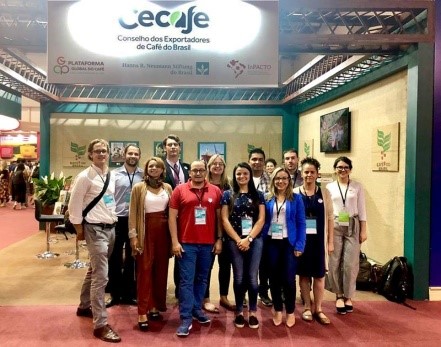

Sustainability played a leading role in the International Coffee Week, showing its clear importance for the coffee industry. Cecafe shared a booth with Hans Neumann Foundation, the Global Coffee Platform and InPACTO Institute. The booth received representatives from teaching institutions, public and private sectors, in addition to producers, including those participating in the Produtor Informado program.
Cecafe was represented by the Chairman of its Deliberative Council, Nelson Carvalhaes, by its Managing Director, Marcos Matos, and by Lilian Vendrametto, its Sustainability Manager.
Meeting between members of the Global Coffee Platform and Research Institutes
GCP used the meeting to present general data about the platform and talk about the history of activities developed and future plans. To generate motivation among stakeholders, the meeting started with a presentation of the PBL methodology. EMATER-MG took active part in the discussions, bringing success stories in regions where Good Farming Practices were introduced.
Agrochemical Project Workshop/Meeting
The Agrochemical Project meeting/workshop was attended by all partner and implementing institutions: Atlântica, Basf, CATI, Cocapec, Comexim, Coomap, Cooabriel, Cecafe, Ecom, Emater (MG and RO), Exportadora Guaxupé, Neumann Foundation, Incaper, JDE, Keurig, Minasul, Nestle, Olam, Senar, Syngenta, Sindiveg and Volcafe. In addition to discussing the next steps, attendees were introduced to a new teaching method named Problem Based Learning methodology. The top priorities of the initiative are: correct application of agrochemicals (application technology), integrated management of pests and diseases and safe storage, among others.

Mesa do Café at the International Coffee Week
The Mesa Café Project is an initiative of InPACTO and CRS – Catholic Relief Services, with the institutional support of Cecafe and GCP. Lilian Vendrametto, Cecafe Sustainability Manager, made an introduction about the Brazilian coffee growing scenario and highlighted Cecafe programs and projects, including its educational actions and positive agenda, which aim at consolidating the best practices in the field. The event counted on intensive participation, evidencing the concern about the topic and possible negative impacts in the whole of the Brazilian production chain.
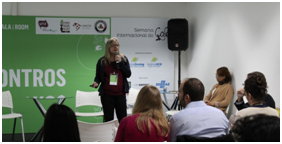
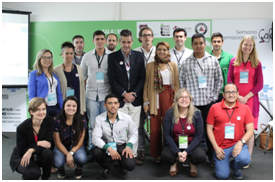
Sustainability Conference (GCSC)
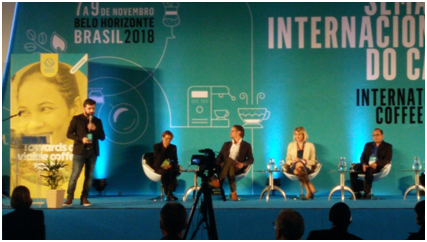
The Global Coffee Platform Sustainability Conference was attended by 340 people from 16 countries. Several presentations portrayed the overall coffee growing scenario in Brazil and in the world, highlighting the good initiatives in Sustainability.
Cecafe Managing Director Marcos Matos was the “National Country Representative” of Sustainability actions, next to other 8 representatives from GCP platforms in the world (Colombia, Honduras, Nicaragua, Kenya, Tanzania, Uganda, Vietnam, Indonesia). Each representative answered questions about partnerships and effective initiatives on behalf of coffee growing sustainability.
During the conference, the Brazilian Initiative on the Responsible Use of Agrochemicals was officially launched, with its partners represented on stage. Cecafe Sustainability Manager Lilian Vendrametto, together with GCP manager in Brazil, presented the project to the audience, highlighting its innovative and participative characteristics.
National Platform Exchange
The stations enabled us to get to learn a bit more about the work of each country in the GCP and also to talk to the coordinators of each country initiative. Kenya and Honduras were the highlights, since both countries recently launched their national platforms and have shown great development. Progress is becoming more tangible as the other countries move towards the direction of Vietnam and Brazil, showing quite interesting results.
Member’s Meeting
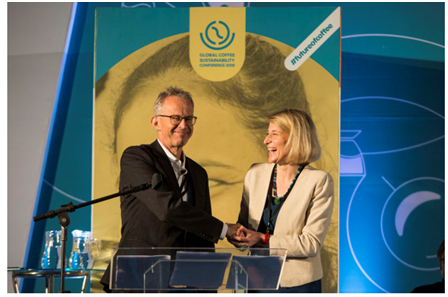
The new member structure was approved in the Member’s Meeting, and two new Board members were elected: the Brazilian Silvia Pizzol, by CNC (National Coffee Council), representing the producers, and the CEO of Rainforest Alliance, Han de Groot, representing the civil society.
Field Trip
After the closing of the International Coffee Week, there was a monitored visit to Farms Caxambu and Aracaçu, in Três Pontas, and to Cooperative COOMAP and Ranch RGM, in Paraguaçu, south of Minas Gerais. Forty-six participants from 15 countries took part in the visit. Cecafe was present to support the event, helping in the organization and demonstration of CSC App to monitor Coffee Sustainability Indicators, in addition to the adoption of sustainable practices by small and large producers in the region.
Having Social Responsibility and Sustainability as one of its main pillars, Cecafe showed during the ICW 2018 the priorities of its current Program and its work agenda for the coming years, based on strengthening partnerships and expanding actions on behalf of Brazilian Coffee e Growing Sustainability.
Cecafe recognizes the challenges in sustainability despite the concrete advances accomplished and understands that such challenges can be overcome by uniting forces and expertise, as shown in the ICW 2018 actions.
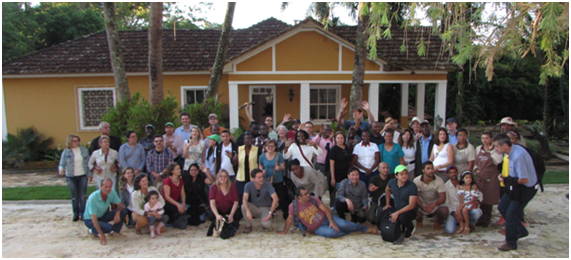
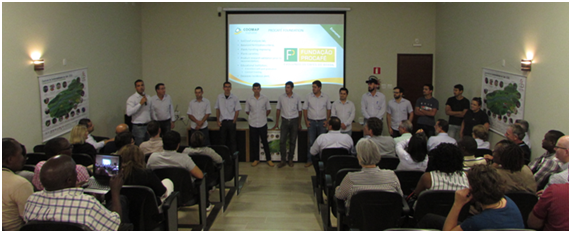
Marcos Matos – CECAFÉ CEO
Lilian Vendrametto – CECAFÉ Sustainability Manager


Leave A Comment